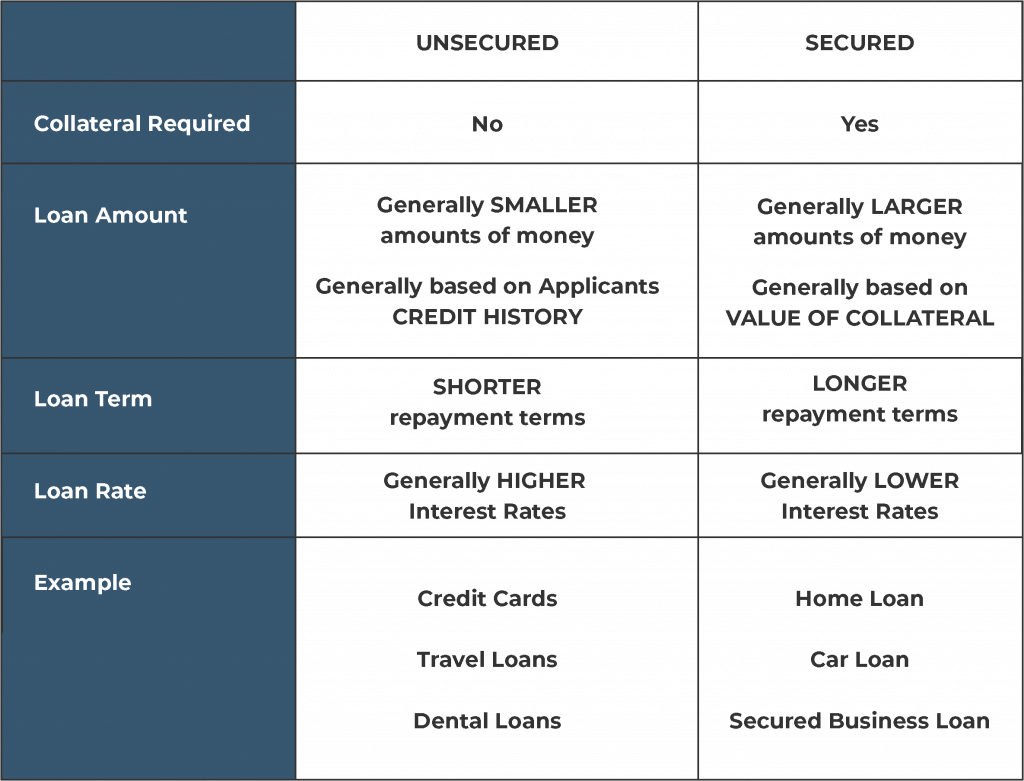There are two main types of loans, secured and unsecured loans. We are going to break down the difference between the two types so you can find out which is best for you.
What is a secured loan?
A secured loan is a loan that requires collateral or security that the lender can take if you don’t repay your loan as agreed. For example, mortgages and auto loans are the most common forms of secured borrowing. Secured loan agreements name an asset as “collateral” that serves as security for a loan. The loan agreement provides the lender with the right to seize collateral in the event that the borrower defaults.
What is an unsecured loan?
An unsecured loan also known as a unsecured personal loan is a loan that doesn’t require you to put up any collateral or security. This means that if you can’t repay the loan, the lender can’t seize or repossess your assets. An example of this would be your credit card. The lender relies on your promise to repay the loan. This is why your credit score is so important. Your credit scores shows your history of repayment and the likelihood of you repaying your loan.Unsecured loans come with higher interest rates than secured loans, because there is a greater risk that the lender won’t be repaid. Here are some examples of unsecured loans:
When to consider unsecured loans or secured loans of credit?
A secured loan is generally easier to get because the lender has less risk because you have put up collateral (security) that you will repay the loan. An unsecured loan tend to have higher interest rates because there is a risk that you may not repay, and you have not put any collateral down to secure the loan. Unsecured loans are also have lower borrowing limits and are harder to qualify for.
When would you use a secured loan?
- Large home renovations
- Large debt
When would you use a unsecured loan?
- Consolidate debt to pay off bills or credit cards
- Fund unplanned emergency expenses
- Home renovations
- Car repairs and maintain

What Happens if I miss a payment?
Your lender will most likely send you a notification via email, text, phone informing you that you missed a payment and instructions on how to make that payment. Lenders and loan services usually allow a grace period before penalising the borrower for missing a payment. Grace periods vary based on the type of loan and the lender. After the grace period the lender may report your missed or late payment to a major credit bureau and this will have an immediate negative effect on your credit score. Your credit score will become worse with every month you miss a payment until you catch up or contact your lender to rectify a solution.

Consequences of loan default for unsecured and secured loans
Delinquency means you are behind one or more payments. Default is a more serious offence than delinquency. Borrowers will first enter the delinquency classification and if they do not catch up on payments or contact their lender to make additional arrangements they will enter the default. Once a loan is classified as “in default” the borrowers information is sent to a debt collection agency whose job is to contact the borrower until the funds are received.
Default for secured loans, will result in the collateral being seized by the lender
Default for unsecured personal loans will result in wage garnishment, or whatever was outlined in loan agreement.
Defaulting will drastically reduce your credit score and this will impact your ability to borrow in the future. The best thing to do if you think you may miss a payment is to contact your lender. Many lenders are willing to work with borrowers to adjust loan terms to make sure you don’t miss a payment.
Unsecured loan over secured loan. Make the right choice.
In summary unsecured loans have no collateral backing or security. Lenders issue funds based solely on the borrowers creditworthiness and promise to repay. These loans are usually for smaller amount of money and have higher interest rates than secure loans. Secured loans on the other hand are for larger amount of money and are secured with an asset as collateral. Because of the collateral required for the loan these loans often take more time to prepare to receive funds. Unsecured loans can be processed easily and funds received quickly. For more information on unsecured personal loans click here.
As a general rule, before you take out a loan make sure you have payoff plan and only borrow what you need and can afford to pay back in the repayment timeframe.
Use the Symple Loans Quick Quote to determine your unsecured personal loan rate, Apply Quickly and Easily Online and Get Approved.
With Symple Loans, you can borrow up to $50,000 for your next auto purchase, choose loan terms up to 7 years, and have the flexibility to pay off the balance at any time without fees or penalties.
GET YOUR PERSONALIZED RATE IN 2 MINUTES



